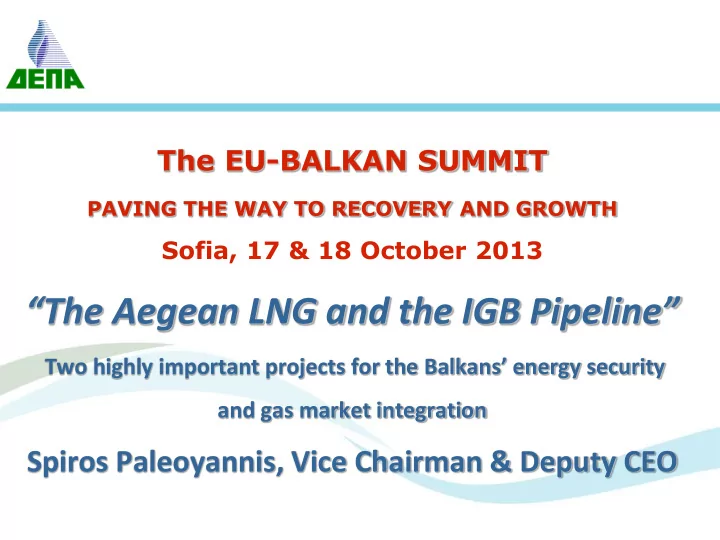

The EU-BALKAN SUMMIT PAVING THE WAY TO RECOVERY AND GROWTH Sofia, 17 & 18 October 2013 “The Aegean LNG and the IGB Pipeline” Two highly important projects for the Balkans’ energy security and gas market integration Spiros Paleoyannis, Vice Chairman & Deputy CEO
Realities and challenges for the European Gas Market Europe as a major energy consumer faces a number of realities and challenges when addressing its future needs for natural gas: Rising gas import dependency Increasing competition for new gas (both conventional and unconventional) sources from emerging economies such as China and India Persisting instability in neighboring gas producing countries (in Middle East and North Africa) Gas market liberalization, functioning and integration issues Effective climate change and energy sustainability policies
SE Europe in particular faces very similar and even more complicated challenges Gas markets in the Balkans remain still national with limited integration and competition at a regional level Nearly all countries in the region have high import dependency on Russian gas Indigenous gas production is unable to meet regional demand and probably it will decline further in the coming years Low energy demand per capita and gasification status however in many countries in the region leave room for future increase of gas consumption (currently at about 25 bcm/a)
New gas infrastructure is necessary to support cross border flows, market integration and fuctioning in the Balkans
SE Europe can be a key market for a number of new gas sources included East Med gas/LNG
DEPA’s vision is to create a new gas gate to SE Europe and establish Greece as a physical and pricing gas hub in the region
To this end Greece supports certain gas pipeline & LNG projects of regional and European interest
The Aegean LNG & the IGB pipeline: The Aegean LNG will be located in Northern Greece and in conjunction with the Greece-Bulgaria Interconnector provides a first class opportunity to a number of new gas sources (including East Med LNG) to reach the growing SE European market
The Aegean LNG: project concept & status Project type: A Floating Storage and Re-gasification Unit (FSRU) Location: Northern Greece (close to the city of Kavala) Project status: a specific strategic evaluation study and a technical feasibility study have been completed by DEPA, while the EIA study is expected to be completed by early 2014 Proposed size/capacity: a ship with 150.000 m3 storage capacity and 5 bcma send out capacity Estimated start date: 2016 CAPEX: 250-300 mio USD EU support: the project has been granted the label of Project of Common Interest by EU Third-party access: TPA exemption likely Project structure: Ideally a consortium with 3-4 investors, including an LNG supplier and regional downstream players 8
Aegean LNG: project rational and strategic importance The Aegean LNG: can redefine the regional gas market landscape since it will be the first re-gas facility targeting the broader SEE region, mainly the Balkans will allow SE Europe to diversify its gas supply sources and have easier access to a number of neighboring LNG producers located in northern Greece is at the crossroads of several key infrastructure projects, including cross-border pipelines (ITG, TAP, IGB, ITGI etc.) and UGS facilities would consist an attractive commercial option, due to its proximity to a number of LNG producers, flexibility, scalability and the ability to meet all relevant environmental, safety, social, legal and regulatory standards
The IGB pipeline IBR IBS IGB
The IGB pipeline: Project concept & status Length: 180km (30km in Greece and 150km in Bulgaria) Diameter: 32’’, bi -directional gas flows Capacity: 3 bcma, expandable to 5 bcma maximum CAPEX: ~200 mio Euros Technical activities: FEED close to completion, procurement tenders for line pipes and LLI ongoing Permitting activities: in final stage Regulatory activities: a market test for long-term capacity booking ongoing Intergovernmental support: an IGA between Greece and Bulgaria signed in 2009 EU support: the project has been granted the label of Project of Common Interest by EU and 45M € contribution have been secured via EEPR First gas: early 2016 Owner: ICGB AD registered in Sofia , jointly formed by DEPA (25%), Edison (25%) and Bulgarian Energy Holding (50%)
The IGB pipeline: project rational and strategic importance The IGB pipeline: will connect Bulgaria with both existing and new gas supply pipelines (i.e. TAP) allowing gas from the Caspian Region and the Middle East to be transported through Turkey and Greece in combination with other existing or under development interconnectors of local nature, (i.e. IBR connecting Bulgaria and Romania, IBS connecting Bulgaria and Serbia etc) would provide incremental gas supplies to the entire SE Europe region similarly, would allow LNG supplies from East Med, North Africa the Gulf and beyond to reach the region through existing and/or new re-gas facilities in Greece in conjunction with the Aegean LNG would consist a real multi- source project (including East Med LNG), essential in meeting SE European market needs and EU energy policy requirements
Conclusions SE Europe currently faces a number of challenges affecting gas demand/supply equation, energy security and gas market integration and functioning Balkan countries in particular seek ways to balance their wariness for the increasing gas import dependency and interest to gain access to alternative gas sources and transport routes by supporting certain gas interconnections as well as LNG and UGS projects Greece and DEPA have a key role to play towards diversification, security of supply and gas market integration in the Balkan region By virtue of its position, Greece is well prepared: a) to transit gas from the Caspian, the Middle East and Eastern Mediterranean to Europe through TAP and ITGI and the proposed East Med pipelines as well as b) to make available LNG supplies from East Med (and other neighboring sources) to the Balkans through the Aegean LNG and IGB System
Thank you for your attention s.paleoyannis@depa.gr
Recommend
More recommend